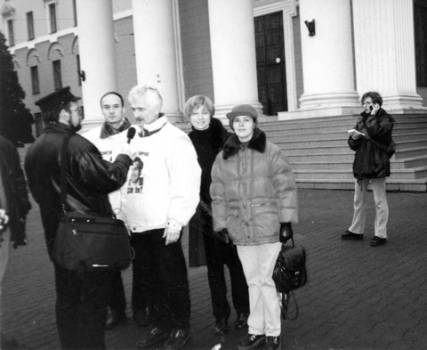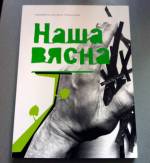“Viasna” marks 16 years of activity

"Viasna" activists during a protest against politically-motivated disappearances outside the KGB Minsk office, 2000. Left to right: Valiantsin Stefanovich, Ales Bialiatski, Tatsiana Reviaka, Alena Laptsionak
It was 16 years ago, when after a wave of brutal arrests during the traditional Chernobyl Way march a group of activists started collecting and disseminating information on the detainees, trying to give them financial support. This is how “Viasna-96” was founded, whose priority was providing assistance to the victims of political repressions and sharing information on these repressions.
“Viasna was started against a background of mass protests in the spring of 1996,” says the organization’s leader Ales Bialiatski in an interview for the edition “Our Viasna” released to mark the organization’s anniversary. “During the protest (26 April, in Minsk), the police blocked the road with cars. All this was accompanied with harsh clashes. Some 200 persons were detained then. Another criminal case was opened. There was an acute need for collecting information and sharing it with the families of the detainees. I should stress that no other protests had been dispersed before that, except for the Dziady memorial march in 1988. Yes, there had been detentions, there had been some traits of harassment: however, there had been nothing like the mass and harsh events of April 1996. I think it was then that Lukashenka decided to stop mass events with violence.”
“We were looking for money and food for those who were held in detention on criminal and administrative charges. The group was working for a month,” says Ales Bialiatski. “Everything was done by volunteers. I was then director of the Maksim Bahdanovich Literary Museum, and also secretary of the Belarusian Popular Front’s central office. The BPF was then the major street force, so the majority of victims were its members.”
“In 1997 the work was joined by a number of volunteers from the Museum, e.g. Palina Stsepanenka. We started looking for contacts in the regions, since the repressions covered the entire country. In 1999 “Viasna” was registered as a national organization, and it kept working in this status until 2003, when the Ministry of Justice and the Supreme Court ordered its dissolution for our involvement in the observation of the 2001 presidential election”, says Ales Bialiatski.


















